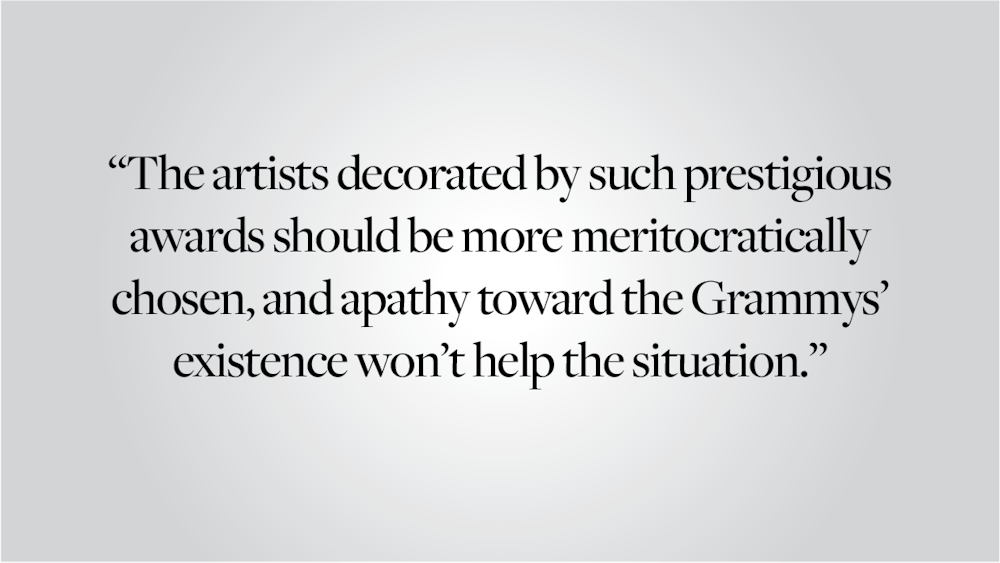As another list of Grammys nominations was released this past weekend, a familiar feeling of disappointment set in. While there were a handful of pleasant surprises in this year’s nominees — like the dominance of female artists in the main categories or the unexpected support given to some of my favorite artists like Victoria Monet and Janelle Monae — I couldn’t help but feel frustrated by the usual oversights in the nominations. As in the past, the choices were largely white and conventional, snubbing some of the year’s most experimental and influential artists like PinkPantheress — even when her collab with Ice Spice, “Boy’s a Liar Pt. 2” was a huge chart hit. Many lesser-known artists who made some of the best music of the year, like Kelela and Amaarae, were also sidelined.
Of course, much of my disappointment comes from personal preference. But I am evidently not the only one who has grown disillusioned with the awards ceremony, which has received some of its lowest viewership numbers in recent years. And it’s not hard to imagine why audience members would be tired of dealing with an institution like the Grammys — for instance, audience members have grown increasingly frustrated by the Recording Academy robbing Beyoncé of the Album of the Year award four times. Already in 2020 and 2021, commentators were claiming that the Grammys “don’t matter anymore.”
But as much as I understand this response, I hesitate to embrace it. The Grammys undeniably represent the highest industry accolades for music, whether we like it or not. The artists decorated by such prestigious awards should be chosen more meritocratically, and apathy toward the Grammys’ existence won’t help the situation.
But what makes the Grammys so important? Even with record-low viewership numbers, the Grammys pull in audiences of millions — and even those who don’t watch may find themselves checking the list of winners the next day. Beyond the joy of seeing talented artists receive recognition for their musical accomplishments, a Grammy can also do wonders for a musician’s career. Billboard claims that artists can see anywhere between a 4% and 400% increase in earnings after simply being featured in the ceremony. Even with record-low viewership at the ceremony, Taylor Swift’s Album of the Year win in 2021 for “Folklore” caused album sales to soar in the following days. If an already successful artist like Taylor Swift can benefit so much from a win, just imagine what a simple nomination could do for the career of a less famous artist. But a list as powerful as that of the Grammy nominees should represent the best of the industry — not arbitrary and unfair factors such as the racial biases of Grammy Voters, which the Recording Academy has long been criticized for.
However, it is not so easy to figure out how the Grammys can improve on this front. The show currently gives out awards based on votes from the industry members who make up the Recording Academy, a similar process to the equally infamous Oscars. This seemingly makes people’s choices more susceptible to peer persuasion than anything else, since it is not feasible to listen to every single eligible release from the year. A shake-up to the award categories might help less well-known artists find their footing. Considering there already exists a “Best New Artist” category, I don’t see any reason why there couldn’t be more categories dedicated to the more up-and-coming hits from new artists so every category doesn’t get filled by the industry’s giants. Having categories that specifically highlight independent artists and experimental music genres would also do a lot to broaden the scope of the ceremony.
Ultimately, we aren’t the ones in control of the Recording Academy, so there’s not much we can directly do to change the Grammys as mere audience members. But pretending that the Grammys have no impact is not the answer. Rather, we can apply collective pressure to change the practices of the Recording Academy. As easy as it is to dislike and dismiss the awards, getting them to slowly change for the better can do a lot of good for everyone involved. I’ve already anecdotally heard from multiple friends that they tuned in to the excellent new Victoria Monet album, “Jaguar II,” after seeing how many nominations she got. Just a few months ago, she wasn’t even included as a performer at the VMAs because they felt it was “too early” in her story, something I doubt would happen again to one of the most nominated people at this year’s Grammys. If we can correct the errors in the selection process of the Grammys, the awards have the potential to be a tool of empowerment for talented artists long neglected by the music industry.
Paulie Malherbe ’26 can be reached at paulie_malherbe@brown.edu. Please send responses to this opinion to letters@browndailyherald.com and other op-eds to opinions@browndailyherald.com.





